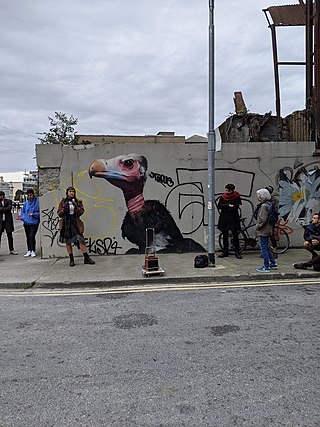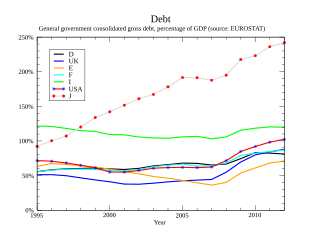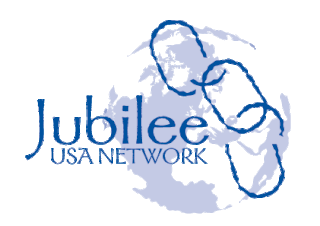
In finance, a bond is a type of security under which the issuer (debtor) owes the holder (creditor) a debt, and is obliged – depending on the terms – to provide cash flow to the creditor. The timing and the amount of cash flow provided varies, depending on the economic value that is emphasized upon, thus giving rise to different types of bonds. The interest is usually payable at fixed intervals: semiannual, annual, and less often at other periods. Thus, a bond is a form of loan or IOU. Bonds provide the borrower with external funds to finance long-term investments or, in the case of government bonds, to finance current expenditure.

A credit default swap (CDS) is a financial swap agreement that the seller of the CDS will compensate the buyer in the event of a debt default or other credit event. That is, the seller of the CDS insures the buyer against some reference asset defaulting. The buyer of the CDS makes a series of payments to the seller and, in exchange, may expect to receive a payoff if the asset defaults.

In finance, a holdout problem occurs when a bond issuer is in default or nears default, and launches an exchange offer in an attempt to restructure debt held by existing bond holders. Such exchange offers typically require the consent of holders of some minimum portion of the total outstanding debt, often in excess of 90%, because, unless the terms of the bond provide otherwise, non-consenting bondholders will retain their legal right to demand repayment of their bonds at par. Bondholders who withhold their consent and retain their right to seek the full repayment of original bonds, may disrupt the restructuring process, creating a situation known as the holdout problem.
Cleary Gottlieb Steen & Hamilton LLP, formerly Cleary, Gottlieb, Friendly & Cox and Cleary, Gottlieb, Friendly, Steen & Hamilton, is an American multinational law firm headquartered at One Liberty Plaza in New York City. Known as a white shoe law firm, Cleary employs over 1,200 lawyers worldwide.
Distressed securities are securities over companies or government entities that are experiencing financial or operational distress, default, or are under bankruptcy. As far as debt securities, this is called distressed debt. Purchasing or holding such distressed-debt creates significant risk due to the possibility that bankruptcy may render such securities worthless.

A vulture fund is a hedge fund, private-equity fund or distressed debt fund, that invests in debt considered to be very weak or in default, known as distressed securities. Investors in the fund profit by buying debt at a discounted price on a secondary market and then using numerous methods to subsequently sell the debt for a larger amount than the purchasing price. Debtors include companies, countries, and individuals.

The Argentine debt restructuring is a process of debt restructuring by Argentina that began on January 14, 2005, and allowed it to resume payment on 76% of the US$82 billion in sovereign bonds that defaulted in 2001 at the depth of the worst economic crisis in the nation's history. A second debt restructuring in 2010 brought the percentage of bonds under some form of repayment to 93%, though ongoing disputes with holdouts remained. Bondholders who participated in the restructuring settled for repayments of around 30% of face value and deferred payment terms, as well as warrants that paid investors based on annual economic growth as part of the same offer, and began to be paid punctually; the value of their nearly worthless bonds also began to rise. The remaining 7% of bondholders were later repaid 25% less than they were demanding, after centre-right and US-aligned leader Mauricio Macri came to power in 2015.
David Martínez Guzmán is a Mexican investor who is the founder and managing partner of Fintech Advisory. This firm specializes in corporate and sovereign debt. Fintech Advisory has offices in London and New York City, and he currently divides his time between those two cities.
A sovereign default is the failure or refusal of the government of a sovereign state to pay back its debt in full when due. Cessation of due payments may either be accompanied by that government's formal declaration that it will not pay its debts (repudiation), or it may be unannounced. A credit rating agency will take into account in its gradings capital, interest, extraneous and procedural defaults, and failures to abide by the terms of bonds or other debt instruments.
MatlinPatterson is a distressed securities fund that participates in distressed and credit opportunities on a global basis. The firm was established in 2002 as a spinout from Credit Suisse First Boston. It is headquartered in New York City and has offices in London and Hong Kong. MatlinPatterson was founded by David Matlin and Mark Patterson. MatlinPatterson, through MatlinPatterson Global Advisers, manages private equity vehicles with a distressed-for-control mandate as well as an open-ended strategy seeking non-control credit investment opportunities.

Debt crisis is a situation in which a government loses the ability of paying back its governmental debt. When the expenditures of a government are more than its tax revenues for a prolonged period, the government may enter into a debt crisis. Various forms of governments finance their expenditures primarily by raising money through taxation. When tax revenues are insufficient, the government can make up the difference by issuing debt.

In the context of sovereign debt crisis, private sector involvement (PSI) refers, broadly speaking, to the forced contribution of private sector creditors to a financial crisis resolution process, and, specifically, to the private sector incurring outright reductions ("haircuts") on the value of its debt holdings.
Gustavo Ferraro is an Argentine investment banker who has worked for many years for major U.S. banks and investment firms, specializing in Latin America-focused investment banking and capital markets. He played the leading role in negotiating the terms of the 2010 restructuring of Argentina's sovereign debt.

Jubilee USA Network is a nonprofit financial reform organization based in Washington, D.C. Jubilee USA's work began in conjunction with the global Jubilee 2000 movement, founded in the late 1990s to advocate for debt relief for developing countries. It is "an alliance of more than 75 U.S. organizations, 650 faith communities and 50 Jubilee global partners."
Republic of Argentina v. NML Capital, Ltd., 573 U.S. 134 (2014), is a U.S. Supreme Court opinion regarding foreign sovereign immunity. After defaulting on its debt and losing a federal collection action, Argentina claimed that its foreign assets were immune from discovery. The Court found that no such immunity existed.

Ajata "AJ" Mediratta is an American investor who has worked in financial markets, particularly in fixed income emerging markets and in sovereign debt restructurings. He is a president at Greylock Capital Management, LLC, an alternative asset investment adviser. Mediratta is active in Greylock Capital's investment activity and debt restructuring efforts globally.

Greylock Capital Management, LLC is a U.S. Securities and Exchange Commission registered alternative investment adviser that invests globally in high yield, undervalued, and distressed assets worldwide, particularly in emerging and frontier markets. The firm was founded in 2004 by Hans Humes from a portfolio of emerging market assets managed by Humes while at Van Eck Global. AJ Mediratta joined the firm in 2008 from Bear Stearns and serves as its president.
Richard Andrew Deitz is an American investment manager. He is the founder and president of London-based investment firm VR Capital Group.

Adam Lerrick is an American economist and politician who served as Counselor to the Secretary of the Treasury, and was previously Donald Trump's nominee for Assistant Secretary of the Treasury for International Finance. Lerrick is also an economist at the American Enterprise Institute.










